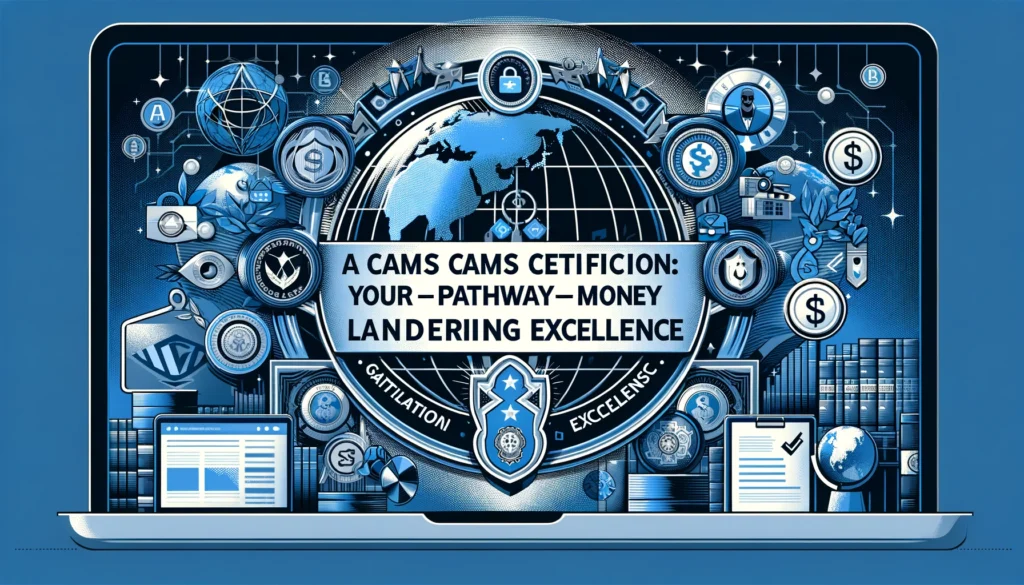Navigating the landscape of the ACAMS Certified Anti-Money Laundering Specialist ACAMS CAMS exam can be a daunting endeavor. This certification is a golden standard for compliance officers, law enforcement personnel, and anyone involved in the prevention of money laundering.
It signifies a profound understanding of anti-money laundering (AML) principles and practices. In this blog, we’ll dissect the CAMS exam, offering insights into the questions, key preparation strategies, and an essential guide to ensure your success.
Introduction
The CAMS certification is more than just a professional accolade; it’s a testament to your commitment to combating financial crime. This certification is recognized globally, opening doors to career advancement and recognition in the field of anti-money laundering.
Here, we delve into the essence of the CAMS exam, equipping you with the knowledge to embark on this challenging yet rewarding journey.
Table of Contents
The ACAMS CAMS (Certified Anti-Money Laundering Specialist) certification is one of the most prestigious qualifications for professionals in the field of anti-money laundering (AML) and financial crime prevention.
It signifies a deep understanding of global and domestic AML/CFT (Combating the Financing of Terrorism) principles and equips individuals with the skills needed to manage and prevent money laundering and terrorist financing activities.
Here’s a comprehensive guide to the CAMS certification, including its importance, the exam structure, preparation tips, and the benefits of earning the certification.
Key Points ACAMS CAMS Exams Questions
The CAMS exam consists of multiple-choice questions that test your knowledge on various AML principles, including the detection and prevention of money laundering, the importance of compliance standards, and the latest AML laws and regulations.
The exam format demands not only memorization of facts but also the ability to apply knowledge in practical, real-world scenarios.
Recertification Process and Requirements
CAMS Exams Questions certification is valid for three years. To maintain the certification, holders must complete the recertification process before their current certification expires. The key components of the recertification process include:
- Continuing Education Credits: Accumulate a minimum of 60 qualifying continuing education (CE) credits over the three-year certification period. These credits can be earned through various activities, including attending conferences, participating in training sessions, completing relevant courses, or engaging in professional development activities related to AML and financial crime prevention.
- Recertification Fee: Pay the recertification fee, which is required to process the recertification application. ACAMS members typically enjoy a reduced fee compared to non-members.
- Compliance with ACAMS Policies: Agree to adhere to the ACAMS Code of Ethics and any other membership or certification policies in place.
Earning Continuing Education Credits
Continuing education credits can be obtained in several ways, and ACAMS encourages a mix of activities to ensure a well-rounded professional development experience. Some examples include:
- ACAMS Webinars and Online Courses: Participate in ACAMS webinars, online training courses, and virtual seminars. These are convenient ways to earn credits and stay informed about the latest trends and compliance practices.
- ACAMS Conferences and Seminars: Attend ACAMS conferences and seminars, which not only provide a significant number of CE credits but also offer networking opportunities with other AML professionals.
- Professional Experience: Certain professional activities, such as serving on relevant committees, publishing articles on AML topics, or speaking at industry events, can also count towards your CE credits.
- External Training: Training and courses offered by recognized institutions or organizations related to AML, financial crime prevention, or compliance can also contribute to your CE total.
Importance of CAMS Certification
- Global Recognition: CAMS is recognized as the gold standard in AML certifications worldwide, which can significantly enhance a professional’s credibility and career prospects in the finance, banking, legal, and compliance sectors.
- Expertise and Knowledge: It demonstrates a professional’s commitment to combating money laundering and terrorist financing, showcasing their expertise and in-depth knowledge of the regulatory environment and compliance measures.
- Career Advancement: Holding a CAMS certification can open doors to senior roles in compliance, AML, risk management, and financial crime prevention, offering higher responsibilities and better compensation.
Crucial Preparation Strategies
- In-depth Study of AML Frameworks: Familiarize yourself with global AML standards, including FATF recommendations and local AML laws.
- Practical Application: Engage in case studies and real-life scenarios to enhance your application skills.
- Continuous Practice: Utilize practice exams and questions to gauge your readiness and identify areas needing improvement.
Basic Exam Guide
| Focus Area | Preparation Tips | Resource Suggestions |
|---|---|---|
| AML Laws and Regulations | Stay updated with the latest AML laws globally and regionally. Study case laws and enforcement actions. | ACAMS website, AML journals, and legal databases. |
| Compliance Standards | Understand the requirements for AML compliance programs under various regulatory bodies. | Compliance guidelines from regulatory authorities. |
| Risk Management | Learn how to conduct risk assessments and implement risk-based AML programs. | Industry best practices and risk assessment tools. |
This table presents a structured approach to mastering critical areas of the CAMS exam. It emphasizes the importance of continuous learning and application of knowledge.
Captivating Your Audience
To complement the textual content of this blog, incorporating a unique and informative image can significantly enhance reader engagement. Visuals aid in the retention of information and can break down complex concepts into more digestible pieces.
Tips for Smooth Recertification
- Plan Ahead: Keep track of your certification expiration date and start planning your recertification activities well in advance to avoid a last-minute rush.
- Document CE Credits: Maintain thorough records of your continuing education activities, including certificates of completion, attendance records, and any other relevant documentation.
- Stay Informed: Regularly check the ACAMS website for updates on recertification policies, available training opportunities, and changes in the AML landscape that could affect your professional practice.
- Leverage ACAMS Resources: Utilize the resources provided by ACAMS, including their comprehensive study materials, webinars, and workshops, to stay current with AML knowledge and practices.
CAMS Exam Structure
- Multiple-Choice Questions: The exam consists of 120 multiple-choice questions, covering a range of topics related to anti-money laundering.
- Duration: Candidates have 3.5 hours to complete the exam.
- Core Topics: The CAMS exam tests knowledge on the prevention and detection of money laundering, key AML compliance standards, the development and implementation of AML policies, and the methods used by launderers and financiers of terrorism.
Preparation Tips
- ACAMS Study Materials: Utilize the official ACAMS study guide, which provides a comprehensive overview of the exam content, including case studies and review questions.
- Training and Webinars: Participate in ACAMS training sessions, webinars, and workshops to gain insights from AML experts and network with other professionals.
- Practice Tests: Take practice exams to familiarize yourself with the format and type of questions you will encounter, helping to identify areas where further study is needed.
Benefits of CAMS Certification
- Professional Development: The CAMS certification process encourages professionals to keep their knowledge current, engaging in continuous learning and professional development.
- Networking Opportunities: Being a part of the ACAMS community allows professionals to connect with a global network of AML experts, sharing knowledge and best practices.
- Increased Compliance and Risk Management Skills: It enhances an individual’s ability to assess and improve the AML controls within their organization, contributing to the overall effectiveness of financial crime prevention strategies.
Conclusion
The CAMS certification is a beacon for those aiming to excel in the anti-money laundering field. By understanding the exam structure, embracing rigorous preparation, and following our basic exam guide, you’re setting yourself up for success.
Earning the CAMS certification is a significant achievement that reflects an individual’s dedication to fighting financial crime. It not only boosts one’s professional stature but also contributes to the global effort against money laundering and terrorist financing.
For those looking to advance their careers in AML and compliance, the CAMS certification is a crucial step that opens up numerous opportunities for growth and development. Remember, this journey is not just about passing an exam; it’s about equipping yourself with the knowledge and skills to make a difference in the world of finance and beyond.






